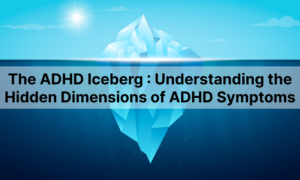ADHD is a neurodevelopmental disorder that affects children and adults, Characterized by difficulties with concentration and impulsivity, and impairs how people deal with daily life activities.
However, dementia is a spectrum of cognitive disorders that influence memory, thinking, and daily tasks. Dementia isn’t one specific disease, several diseases can cause dementia.
In this blog, we’ll discuss memory challenges, brain chemistry, and the very interesting link between ADHD and dementia risk.
Difference between ADHD and Dementia:
ADHD and dementia are two different disorders that affect people in different ways. Here’s a brief description of the main differences:
| Aspect | ADHD | Dementia |
| Onset and Age | Typically recognized in childhood or adolescence | Primarily associated with aging, often in older adults |
| Symptoms | Inattention, hyperactivity, impulsivity | Cognitive decline, affecting memory and daily tasks |
| Developmental Stage | Occurs early in life, may persist into adulthood | Develops later in life, with early-onset dementia possible |
| Neurotransmitter | Associated with dopamine | Involves changes in neurotransmitters like acetylcholine and serotonin, depending on the type of dementia |
| Genetic Factors | Has a genetic component, and may run in families | Some types, like Alzheimer’s, have genetic risk factors |
| Impact on Daily Life | Affects academic, occupational, and social functioning | Significant impact on daily activities, leading to increased dependency over time |
| Treatment Approach | Managed with behavioral therapies, medications, or a combination | Treatment focuses on symptom management, support, and sometimes medications; no cure |
Symptoms associated with ADHD:
- Excessive Fidgeting or Restlessness:
- Difficulty staying seated, often fidgets or taps hands or feet.
- Inability to Stay Quiet:
- Talks excessively, interrupts others, and has difficulty waiting for turns.
- Impulsivity:
- Acts without thinking through consequences, leading to impulsive decision-making.
- Difficulty Waiting:
- Finds it challenging to wait in line or for one’s turn in activities.
- Difficulty Playing Quietly:
- Engages in activities loudly and energetically, even when inappropriate.
- Impulsive Risk-Taking:
Engages in risky behavior without considering potential dangers.
Cognitive symptoms of ADHD:
The severity and combination of cognitive symptoms can vary among individuals with ADHD;
- Inattention:
- Difficulty sustaining attention in tasks or play activities.
- Making careless mistakes due to lack of attention to detail.
- Being easily distracted by unrelated stimuli.
- Forgetfulness in daily activities.
- Impaired Working Memory:
- Difficulty holding information in mind for tasks requiring mental effort.
- Forgetfulness in the middle of tasks leads to incomplete or abandoned activities.
- Executive Functioning Deficits:
- Struggles with organizing tasks and activities.
- Difficulty initiating tasks and maintaining an appropriate pace.
- Challenges in managing time effectively.
- Difficulty with Focus and Follow-Through:
- Frequently shifting attention from one unfinished activity to another.
- Difficulty completing tasks or assignments due to distractibility.
- Procrastination:
- Tendency to delay starting tasks, even those that are important or require immediate attention.
- Impulsivity:
- Acting without thinking through consequences.
- Difficulty inhibiting responses, leading to impulsive decision-making.
- Difficulty with Multitasking:
- Struggles to manage multiple tasks simultaneously.
- Becomes overwhelmed when faced with too many demands at once.
- Daydreaming:
- Frequent episodes of mind wandering or daydreaming, especially during activities that require sustained attention.
ADHD impact on memory:
ADHD (Attention Deficit Hyperactivity Disorder) can have a significant impact on memory, influencing both short-term and long-term memory in several ways;
- Working Memory Challenges:
Working memory involves holding and manipulating information temporarily for tasks such as problem-solving and following instructions. Individuals with ADHD may experience difficulties in maintaining and using information in their working memory, leading to forgetfulness during tasks.
- Forgetfulness in Daily Activities:
People with ADHD may struggle with remembering routine tasks or activities, such as forgetting to bring necessary materials to school or work, missing appointments, or neglecting chores.
- Inattentive Memory Lapses:
Inattention is a core symptom of ADHD, and individuals may not fully register or encode information when not fully focused. This can result in gaps in memory and difficulties recalling details.
- Problems with Organization:
Challenges in organizing tasks and belongings may lead to difficulty remembering where items are placed or the sequence of steps required to complete a task.
- Difficulty Retaining Information:
Learning and retaining new information can be challenging for individuals with ADHD. The distraction-prone nature of ADHD may impact the encoding process, making it harder to transfer information from short-term to long-term memory.
- Time Management Issues:
Individuals with ADHD may struggle with estimating and managing time effectively. This can result in difficulties in remembering deadlines or appointments.
- Impaired Prospective Memory:
Prospective memory involves remembering to perform tasks in the future. ADHD may impact this aspect of memory, leading to forgetfulness about planned activities or obligations.
Can ADHD lead to Dementia:
Recent research explored the potential link between a history of ADHD and an increased risk of developing particular forms of dementia later in life. While the exact nature of this relationship has not yet been determined, researchers have discovered common aspects, particularly in the field of neurotransmitters and genetic factors.
- Neurotransmitter:
ADHD is connected to dopamine, a neurotransmitter associated with happiness, however different forms of dementia, like Alzheimer’s, show changes in neurotransmitters such as acetylcholine and serotonin. Understanding these linkages can help us understand more about how our brains function and the possible relationships between ADHD and dementia.
- Genetic Factors:
Both ADHD and dementia have genetic components. Individuals with a family history of ADHD may be more predisposed to the condition. Similarly, certain forms of dementia, including Alzheimer’s, have genetic risk factors.
Can teens get Alzheimer’s?
Alzheimer’s disease (AD) is a neurodegenerative disease that causes memory loss, thinking problems, behavior changes, and brain cell death. It’s the most common cause of dementia.
Alzheimer’s disease is generally connected with old age, typically affecting those aged 65 and older. However, in extremely rare situations, people in their 30s, 40s, or even younger can have early-onset Alzheimer’s disease.
Early-onset Alzheimer’s is uncommon, causing fewer than 5% of all Alzheimer’s cases. It occurs significantly less frequently among teenagers and young adults. Early-onset Alzheimer’s can be caused by genetic factors, such as familial Alzheimer’s disease (FAD), an inherited type of the condition.
It’s important to highlight that memory and cognitive impairments in teenagers are more frequently associated with other factors, such as stress, mental health illnesses, or learning disorders.
Does ADHD Cause Memory Loss:
It’s essential to recognize that memory issues can vary among individuals with ADHD, and not everyone with ADHD will experience significant memory problems.
ADHD (Attention Deficit Hyperactivity Disorder) may not lead to memory loss, although it is associated with some memory problems. Individuals with ADHD often experience difficulties with working memory – the ability to temporarily hold and manipulate information. This may result in forgetfulness, especially with tasks that require immediate attention.
The continuous companion of distractibility in ADHD contributes to memory difficulties, making it more difficult to maintain concentration and encode information properly. It’s important to remember that these kinds of problems are more about short-term memory and attention than a permanent loss of information.
Conclusion:
ADHD affects children and adults, leading to attention and impulse problems, whereas dementia, common in older age, impairs memory and daily tasks. Its impact on memory is manifested through issues with focus, organization, and working memory.
The links between ADHD and dementia include neurotransmitters and heredity.
It’s important to highlight that ADHD may not always lead to dementia. Both share similarities, yet they affect people at different stages of life.
Teenage memory problems usually occur due to stress or poor mental health, not Alzheimer’s disease. ADHD can impair short-term memory, although not permanently.







